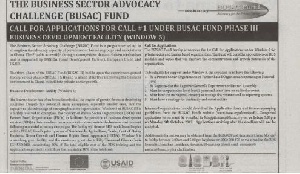 Busac fund to empower private sector
Busac fund to empower private sector
The third phase of the Business Sector Advocacy Challenge (BUSAC) fund, aimed at strengthening the capacity of the private sector to advocate and encourage public-private dialogue funds was launched in Accra on Wednesday.
Speaking at the event, which attracted hundreds of entrepreneurs, BUSAC fund manager, Nicholas Gebara, revealed that the fund has, after a decade of support, provided over780 grants worth over USD 40 million to various Public-Sector Organizations (PSOs) across the ten (10) regions of the country.
The fund manager added that his outfit has been able to enhance the advocacy capacity of grantees through systematic training especially in Phases 2, by organizing more than 747 training sessions involving close to 12,000 participants.
“We have ‘opened the eyes’ of PSOs in developing the potential of business advocacy and built their capacity to successfully address the needs of their members to Government”.
Mr. Gebara noted that they have, through dialogue, been able to narrow the gap between the Private and public sectors on improving the business environment of Small and Medium Enterprises (SMEs).
“We sensitized public officials at district level in understanding the benefits of engaging in constructive dialogue with the private sector representatives and facilitated dialogue with Ministers and relevant Parliamentary select Committees”, he said.
Expectations
The BUSAC fund manager expressed the belief that by the end of this phase, the fund legacy is to have an empowered private sector that would be capable of presenting evidence-based policies that to lead to a conducive business environment for the benefit of the Ghanaian economy.
Contributing, a representative of the Minister for Business Development, Mr. Joe Tackie, said government needs a very strong private sector as a partner to be able to provide the needed jobs that the country is yearning for because the private sector is the engine of growth of the economy.
“We want to believe that the business of government is to govern and not necessarily do business. This is because the private sector is well vexed in the act of business and therefore they should be allowed to do business whiles government creates the enabling environment for them to thrive, Mr. Tackie explained.
For her part, the Danish Ambassador to Ghana, Tove Degnbol, said BUSAC has helped about 500 women in the Upper West Region who hitherto were denied the right to secure and own lands to be able to do so on collective bases.
She added that the Ghana Institute of Engineers was also able to come up with a new legislation which regulated the activities of building contractors, civil and mechanical engineers, courtesy the initiative of BUSAC.
“The advocacy activities of the institution led to the Engineering Council Act in 2011, which has improved the standards of engineers and helped eliminate unqualified practitioners in the sector”, she revealed.
History of BUSAC
Speakers recalled that in 2004, the European Union, the US government, with the support of DANIDA being the anchor partner, came up with a fund programme aimed at creating the necessary platform for government’s business to dialogue and engage the public sector to design the right landscape for business growth.
It has since developed a strong roadmap by creating awareness among businesses and designated the right platform upon which businesses can really engage and bring their issues to the public sector.